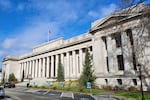The U.S. Supreme Court announced Tuesday it won’t hear a case challenging Washington’s capital gains tax.

The Washington State Supreme Court upheld the new capital gains tax in a 7-2 decision in early 2023.
Jeanie Lindsay / NW News Network
A conservative think tank, Freedom Foundation, filed a petition in August asking the court to weigh in, questioning the state's constitutional authority to tax out-of-state transactions under the federal Commerce Clause.
“We live in a lawless state where the governor and state Supreme Court justices routinely ignore state laws and the state constitution,” said Brian Minnich, Freedom Foundation’s executive vice president.
The capital gains tax applies to sales of assets like stocks and bonds that are worth more than $250,000. It brought in nearly $900 million of state revenue in its first year, after being upheld by the Washington State Supreme Court last spring. That funding is largely earmarked for school construction, child care and early learning.
Republicans in the state Legislature, including House Minority Leader Drew Stokesbary (R-Auburn) also say they're disappointed but unsurprised that the country's highest court won't take the case.
"It really hinged on the dormant Commerce Clause… it's a concept that even some of the conservative Supreme Court justices appointed by Republicans have expressed some skepticism toward," Stokesbary said. "It is of course disappointing – disappointing that legislative Democrats essentially got away with the word games they played."
Supporters of the tax, meanwhile, are celebrating the court's rejection.
"The court's decision today is a huge victory for Washington kids and families," said Treasure Mackley, director of Invest in Washington Now. "For the first time in a very very very long time, the wealthiest in Washington state are being asked to pay what they truly owe."
A recent report shows Washington no longer has the most inequitable tax code in the country, in part, because of the capital gains tax — the state now ranks second, behind Florida.
But even though the court challenge is over, the capital gains tax is still unsettled. Critics are optimistic about the proposed ballot initiative aiming to repeal the tax that looks likely to head to Washington voters this November.